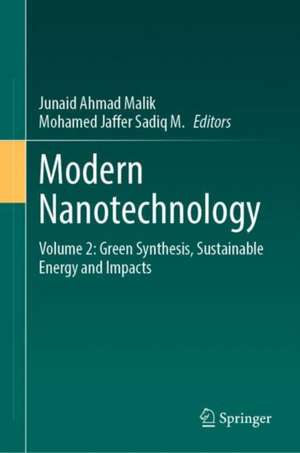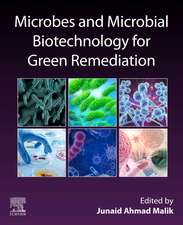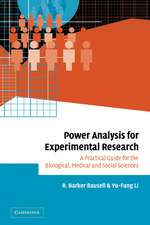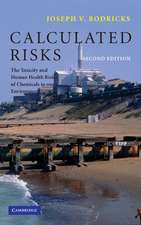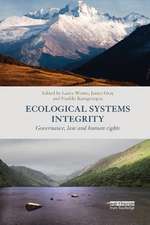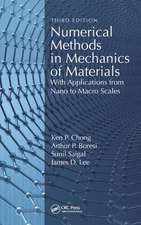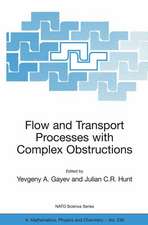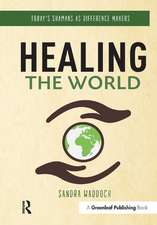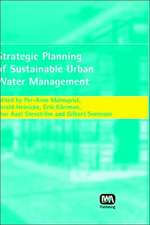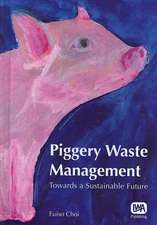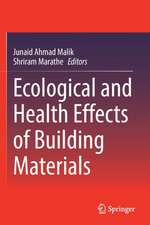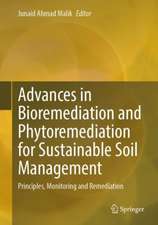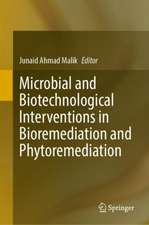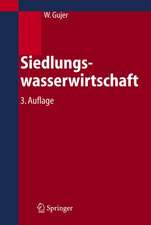Modern Nanotechnology: Volume 2: Green Synthesis, Sustainable Energy and Impacts
Editat de Junaid Ahmad Malik, Mohamed Jaffer Sadiq Mohameden Limba Engleză Hardback – 18 iul 2023
Volume 2 focuses on toxicological assessment, negative impacts of nanomaterials, green synthesis, energy conversion, and storage applications.
| Toate formatele și edițiile | Preț | Express |
|---|---|---|
| Hardback (2) | 796.76 lei 43-57 zile | |
| Springer Nature Switzerland – 18 iul 2023 | 796.76 lei 43-57 zile | |
| Springer International Publishing – 18 iul 2023 | 915.48 lei 43-57 zile |
Preț: 796.76 lei
Preț vechi: 971.66 lei
-18% Nou
Puncte Express: 1195
Preț estimativ în valută:
152.48€ • 158.60$ • 125.88£
152.48€ • 158.60$ • 125.88£
Carte tipărită la comandă
Livrare economică 14-28 aprilie
Preluare comenzi: 021 569.72.76
Specificații
ISBN-13: 9783031311031
ISBN-10: 3031311035
Pagini: 481
Ilustrații: XII, 481 p. 54 illus., 51 illus. in color.
Dimensiuni: 155 x 235 mm
Greutate: 0.87 kg
Ediția:1st ed. 2023
Editura: Springer Nature Switzerland
Colecția Springer
Locul publicării:Cham, Switzerland
ISBN-10: 3031311035
Pagini: 481
Ilustrații: XII, 481 p. 54 illus., 51 illus. in color.
Dimensiuni: 155 x 235 mm
Greutate: 0.87 kg
Ediția:1st ed. 2023
Editura: Springer Nature Switzerland
Colecția Springer
Locul publicării:Cham, Switzerland
Cuprins
Part1. Nanotechnology and Sustainability: Introduction and Fundamental Aspects.- Chapter1. Nanotechnology and Sustainability: Toxicological Assessments and Environmental Risks.- Chapter2. Microbial Nanotechnology: Current Development and Potential Applications in the Field of Biotechnology.- Chapter3. Green Functional Nanomaterials: Synthesis and Application.- Chapter4. Green Functional Nanomaterials: Synthesis and Applications (Plant & Bacteria Mediated Synthesis).- Chapter5. Green Synthesis of Nanoparticles Using Plant and Biological Organisms and their Biomedical Applications.- Chapter6. An Insight into the Plants and Bacteria Mediated Green Synthesis of Nanomaterials and their Potential Applications.- Chapter7. Exploration on Green Synthesis of Nanoparticles from Plants and Microorganisms and their Biological Applications.- Chapter8. Plant-based Synthesis of Gold and Silver Nanoparticles and Their Applications: A Review.- Chapter9. Nanotechnology in Cancer Chemoprevention: In Vivo and In Vitro Studies and Advancement in Biological Sciences.- Chapter10. Nanotechnology: A Next-Gen Tool for Sustainable Aquaculture.- Part2. Nanotechnology for Energy Conversion and Storage.- Chapter11. Nanotechnology in Renewable Energy Conversion and Storage Process.- Chapter12. Application of Nanotechnology in Bioenergy Production from Algae and Cyanobacteria.- Chapter13. Graphene Based Nanomaterials for Supercapacitor Applications: A Critical Review.- Chapter14. Nanocomposite Materials for Dye-Sensitized Solar Cells.- Chapter15. Thermophysical Characteristics of Nanofluids: A Review.- Part3. Environmental Impacts of Nanotechnology.- Chapter16. Nanomaterials in Aquatic Environments: Impact and Risk Assessment.- Chapter17. Nanoparticles in Aquatic Environment: An Overview with Special Reference to their Ecotoxicity.- Chapter18. Eco-friendly Sustainable Nanocomposite Food Packaging Materials: Recent Advancements, Challenges and Way Forward.- Chapter19. Nanotechnology at Workplace: Risks, Ethics, Precautions and Regulatory Considerations.- Chapter20. Nanotechnology: Ethical Impacts, Health Issues, and Safety Issues.
Notă biografică
Dr. Malik received B.Sc. (2008) Science from the University of Kashmir, Srinagar, J&K; M.Sc. (2010) in Zoology from Barkatullah University, Bhopal, Madhya Pradesh; and PhD (2015) in Zoology from the same university. He completed his B.Ed program in 2017 from the University of Kashmir, Srinagar, J&K. He started his career as Lecturer in School Education Department, Govt. of J&K for 2 years. Dr. Malik is now working as a Lecturer in Department of Zoology, Govt. Degree College, Bijbehara, Kashmir (J&K) and actively involved in teaching and research activities. He has more than 8 years of research experience. His areas of interest are ecology, soil macrofauna, wildlife biology, conservation biology etc. Dr. Malik has published more than 20 research papers in various national and international peer-reviewed journals. He has published 24 books, 36 book chapters and more than 10 popular editorial articles with various publishers like Springer Nature, Elsevier Inc., Taylor and Francis Group and IGI Global. Dr. Malik is acting as the Editor-in-Chief of Inventum Biologicum (An International Journal of Biological Research) published by World Biologica, India. He is also serving as editor and reviewer of several journals with a reasonable repute. He has participated in several State, National, and International conferences, seminars, workshops, and symposia and more than 20 conference papers are to his credit. He is the life member of SBBS (Society for Bioinformatics and Biological Sciences) with membership id LMJ-243.
Readers may contact him at editor@worldbiologica.com, or malik.junaidahmad@gmail.com
Dr. Mohamed Jaffer Sadiq Mohamed, PhD, is working as a Postdoctoral Researcher in the King Fahd University of Petroleum and Minerals, Dhahran, Saudi Arabia. Dr. Sadiq received BSc (2006) in Chemistry from Bharathiyar University, Coimbatore, Tamil Nadu; MSc (2008) in Applied Chemistry from National Institute of Technology (NIT), Tiruchirappalli, Tamil Nadu; MTech (2014) in Nanotechnology from Karunya University, Coimbatore, Tamil Nadu; and PhD (2017) in Chemistry from National Institute of Technology Karnataka (NITK), Surathkal, Mangalore, Karnataka. He started his career as Chemist in Hindustan Zinc Limited, Rajasthan, for four years. He worked as a Postdoctoral Researcher in the Yunnan University, Kunming, China for two years. Dr. Sadiq is now working as a Postdoctoral Researcher in the King Fahd University of Petroleum and Minerals, Dhahran, Saudi Arabia, and is actively involved in teaching and research activities. He has more than 10 years of industrial and research experience. His areas of interest are Nanomaterials/Nanocomposites/Nanocrystals/Perovskites based photocatalysis, water splitting, fenton’s like catalysts, electrocatalysis (HER, OER, ORR), heterogeneous catalysis, supercapacitors, fuel cell catalysis, and solar cells. He has authored 2 book chapters, edited 2 books, published 30 research articles and technical papers in international peer-reviewed journals like Springer, Elsevier, RSC, ACS, etc. He is also serving as editor and reviewer of several journals with a reasonable reputation. He has participated in several State, National, and International Conferences, seminars, workshops, and symposia, and more than 20 conference papers are to his credit.
Readers may contact him at: sadiqmsc@gmail.com
Readers may contact him at editor@worldbiologica.com, or malik.junaidahmad@gmail.com
Dr. Mohamed Jaffer Sadiq Mohamed, PhD, is working as a Postdoctoral Researcher in the King Fahd University of Petroleum and Minerals, Dhahran, Saudi Arabia. Dr. Sadiq received BSc (2006) in Chemistry from Bharathiyar University, Coimbatore, Tamil Nadu; MSc (2008) in Applied Chemistry from National Institute of Technology (NIT), Tiruchirappalli, Tamil Nadu; MTech (2014) in Nanotechnology from Karunya University, Coimbatore, Tamil Nadu; and PhD (2017) in Chemistry from National Institute of Technology Karnataka (NITK), Surathkal, Mangalore, Karnataka. He started his career as Chemist in Hindustan Zinc Limited, Rajasthan, for four years. He worked as a Postdoctoral Researcher in the Yunnan University, Kunming, China for two years. Dr. Sadiq is now working as a Postdoctoral Researcher in the King Fahd University of Petroleum and Minerals, Dhahran, Saudi Arabia, and is actively involved in teaching and research activities. He has more than 10 years of industrial and research experience. His areas of interest are Nanomaterials/Nanocomposites/Nanocrystals/Perovskites based photocatalysis, water splitting, fenton’s like catalysts, electrocatalysis (HER, OER, ORR), heterogeneous catalysis, supercapacitors, fuel cell catalysis, and solar cells. He has authored 2 book chapters, edited 2 books, published 30 research articles and technical papers in international peer-reviewed journals like Springer, Elsevier, RSC, ACS, etc. He is also serving as editor and reviewer of several journals with a reasonable reputation. He has participated in several State, National, and International Conferences, seminars, workshops, and symposia, and more than 20 conference papers are to his credit.
Readers may contact him at: sadiqmsc@gmail.com
Textul de pe ultima copertă
This two-volume set provides a comprehensive overview of modern nanoscience, and encompasses advanced techniques of nanocomposite materials that make their way from the laboratory to the field for the revival of energy and environmental systems in a sustainable manner. It includes the design and the sophisticated fabrication of nanomaterials along with their potential energy and environmental applications, while looking at how nanoscience and nanotechnology can be used to promote environmentally friendly processes and strategies. The books' purpose is to promote eco-friendly methods and techniques by covering many elements of both the synthesis and uses of nanoparticles and nanofluids for energy and environmental engineering. They provide an up-to-date synthesis of nanocomposite materials for modern nanotechnology applications in the fields of environment protection, heterogeneous catalysis, wastewater treatment, fuel cells, electrochemical energy conversion, and storage applications. The set is designed for environmental scientists, nanotechnologists, chemists, engineers, and individuals seeking current research on nanotechnology and its applications in environmental engineering. Graduate students working in these fields will also find it a valuable resource.
Volume 2 focuses on toxicological assessment, negative impacts of nanomaterials, green synthesis, energy conversion, and storage applications.
Caracteristici
Focuses on toxicological assessment, negative impacts of nanomaterials, green synthesis, and storage applications
Encompasses advanced techniques of nanocomposite materials for sustainable energy
Discusses the creation of dependable and environmentally friendly processes using nanoscience
Encompasses advanced techniques of nanocomposite materials for sustainable energy
Discusses the creation of dependable and environmentally friendly processes using nanoscience
